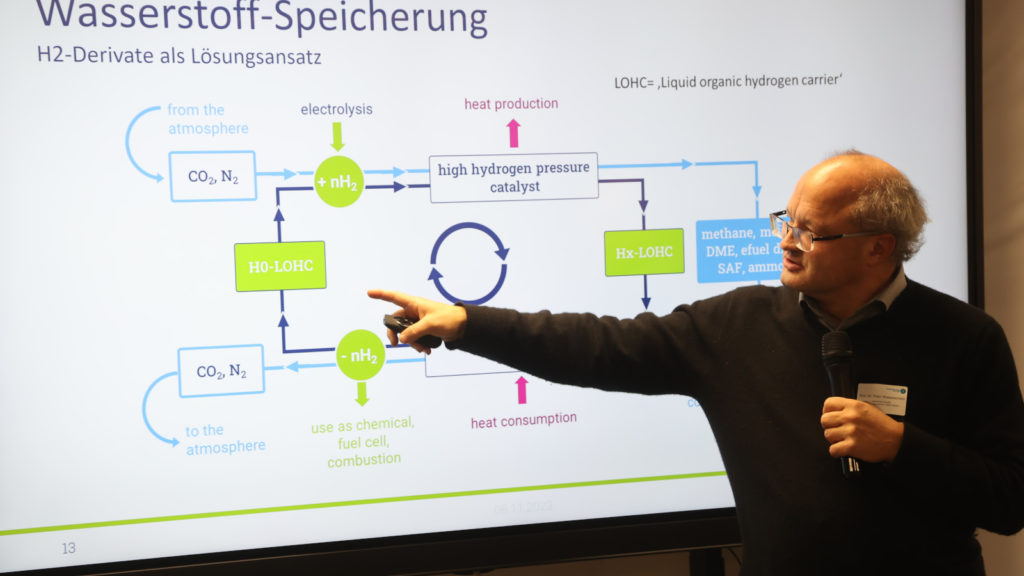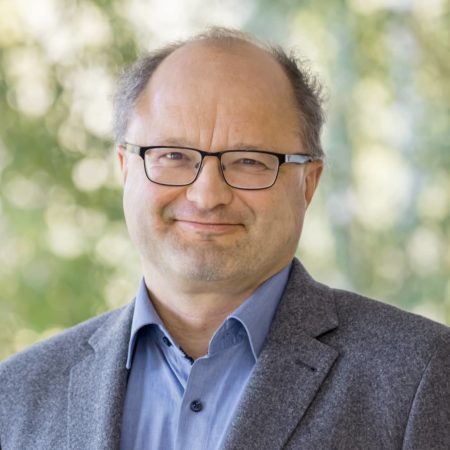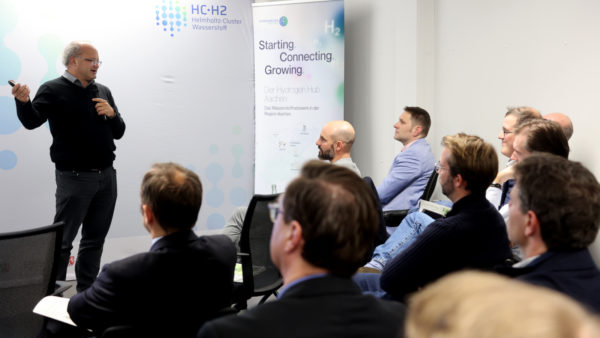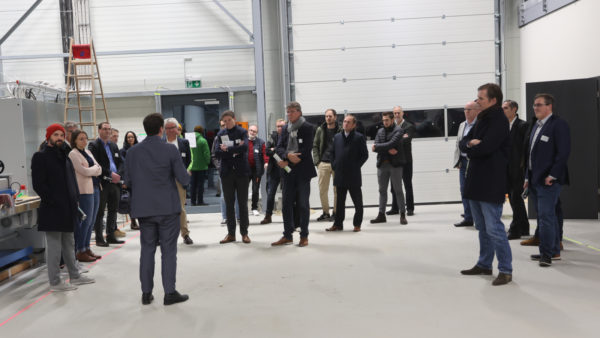“We Can Build Highly Complex Systems”

HC-H2 spokesperson Prof. Peter Wasserscheid explains how the future hydrogen economy can work.
Photos: Forschungszentrum Jülich/Jansen
Germany’s opportunity in the hydrogen world of tomorrow
Producing a simple mass product is not necessarily one of Germany’s strengths. “We can build highly complex systems,” Prof. Peter Wasserscheid said in his latest presentation. The hydrogen researcher was outlining the significant role that Germany could play in the hydrogen economy of the future, namely in developing and producing complex systems such as electrolyzers and fuel cells. Wasserscheid had been responding to a question posed by one of the guests at the Hydrogen meet&connect network meeting.
The network meetings are a series of events hosted by Hydrogen Hub Aachen. This is the joint hydrogen initiative of the City of Aachen, the districts of Aachen, Düren, Euskirchen, and Heinsberg, and the Aachen Chamber of Industry and Commerce (IHK).
We are a leading country for process technologies. That’s our speciality.
Prof. Peter Wasserscheid

The latest Hydrogen meet&connect event was held in familiar surroundings for Wasserscheid. He is spokesperson of the Helmholtz Cluster for a Sustainable and Infrastructure-Compatible Hydrogen Economy (HC-H2), which hosted the most recent Hydrogen meet&connect network meeting at its headquarters in Brainergy Park Jülich. The event is hosted at a different location each time. This time around, entrepreneurs from IHK Aachen interested in the subject of hydrogen came to visit Germany’s largest hydrogen infrastructure project in Jülich.
Canada as an example of a producing country
In light of Peter Wasserscheid’s presentation, the question regarding Germany’s role in the future world of hydrogen was to be expected. Germany will be able to produce hydrogen in the future and should definitely do so, according to Wasserscheid. “But in Canada, for example, hydrogen can be realistically produced for € 1.50 per kilogramme,” a figure that would be unthinkable in Germany, the researcher added. The reasons for this are that Canada is almost 27 times larger than Germany, but has half as many inhabitants. And there is enormous potential for harvesting renewable energy from wind power, for example. These are the best prerequisites for producing green hydrogen in such large quantities that would not be possible in Germany.
Germany will not export hydrogen to other countries, but will instead be able to cover a proportion of its own consumption, Wasserscheid explained. Whatever Germany is unable to produce itself will have to be imported in future, he added. This was, and continues to be, the case in the fossil fuel era. Hydrogen can be produced much more cheaply in other regions of the world. But Germany could become a leading exporter of hydrogen technologies, said Wasserscheid.
An oxidation reactor with moving parts – a crazy idea that worked
Wasserscheid cited the example of a very well-known fossil fuel technology system. “Think of an oxidation reactor with moving parts,” he said, adding that it was crazy to invent and develop such a system. The oxidation reactor with moving parts, or to put it simply the internal combustion engine, clearly demonstrates that complex systems can be useful and profitable. “We are a leading country for process technologies. That’s our speciality,” said Peter Wasserscheid. The race to see which countries will make money with electrolyzers and fuel cells is still open. And Germany has an edge. The internal combustion engine has shown that. It is also an example of how an enormously complex technology can be rolled out on a large scale, becoming more economical and more affordable for the consumer, said Wasserscheid. Such an effect is also conceivable for hydrogen technologies, he added.
Wasserscheid also outlined storage (short term and long term) and transport as another important field related to the future of hydrogen, which is the scientific priority of Forschungszentrum Jülich’s Institute for a Sustainable Hydrogen Economy (INW). INW forms the core of HC-H2. It conducts basic research on the storage (short term and long term) and transport of hydrogen. Of course, to stick with the example, hydrogen that is produced for € 1.50 per kilogramme in Canada will become more expensive when it is transported to Europe, Wasserscheid explained.
“Innovation is essential to keep the cost of these logistitics as low as possible,” he added. This innovation should preferably come from the Rhenish mining area. This is one goal of HC-H2. “We want to be a showcase for technologies. A key objective is that our partners can earn money with the technologies.”

Peter Wasserscheid speaking at the Hydrogen meet&connect network meeting.
Funding supports structural change
Wasserscheid explained how he is often confronted with the statement that “money is once again being invested in research” in HC-H2. In the case of HC-H2, the federal government and state government of North Rhine-Westphalia are investing more than € 1 billion by 2038. It is indeed true that a significant portion of the funding for HC-H2 is being invested in research that supports structural change. Ultimately, HC-H2 is not solely about research; it also needs operators who can make the individual projects possible in the first place. These operators are partners from industry, business, and administration. Together, they are initiating demonstration projects that showcase innovative hydrogen technologies in the Rhenish mining area. The role of HC-H2 here is to ensure the innovative nature of the projects and to help the partners in applying for the available funding. “In the end, the partners should be in a position to market the systems and to create value here in the Rhenish mining area,” Wasserscheid explained.
HC-H2 wants to be an accelerator
HC-H2 and the Rhenish mining area do not have a lot of time. The race for hydrogen technologies is still open and Germany still has an advantage, according to Wasserscheid. Germany also had an advantage in the field of photovoltaics at the start of the 2000s. Today, this market is overwhelmingly dominated by China, since the country massively invested in its domestic industry. This brought Peter Wasserscheid to his final message of the evening concerning HC-H2: “We want to be an accelerator for innovative hydrogen technologies. In a few years’ time, we want the Colombian energy minister to come to the Rhenish mining area, take a look at our demonstrations projects, and say: I want to buy that and that and that.”
After Wasserscheid’s presentation, the group visited INW’s technical centre where interior construction work is ongoing. Event organizers Fabian Müller Lutz and Annadora Voß (Hydrogen Hub Aachen) and Fabian Patzak, Vanessa Düster, and Severin Foit (HC-H2’s Hydrogen Network NRW team) invited the participants to a reception with light refreshments.

The Hydrogen meet&connect network meeting group visiting INW’s technical centre.
